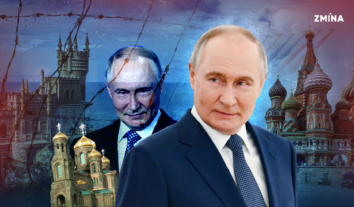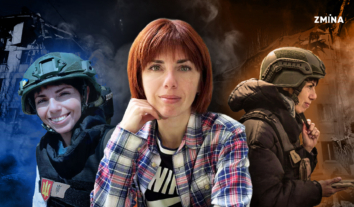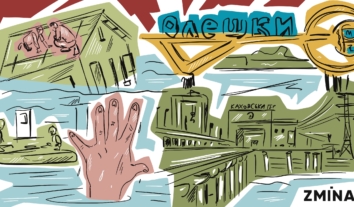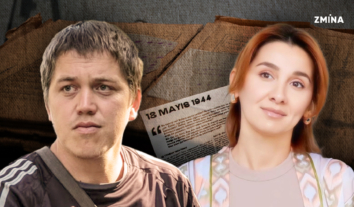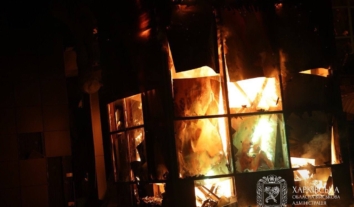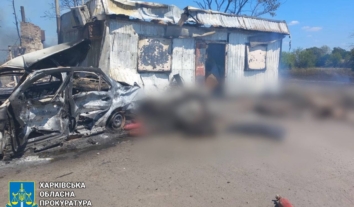A story of a man spent two months in captivity in the Russian pre-trial detention center with other civilians and volunteers
Yevhen Yamkovyi, a resident of Kahovka, a city in the Kherson region on the left bank of the Dnipro river occupied by Russian forces, was detained at the checkpoint “Armyansk” in the northern part of the Crimean peninsula on January 6, 2023. Then, he was transferred to the pre-trial detention center No. 2 in Simferopol, where he met Oleksandr Babych, a mayor of the city Hola Prystan’, Yevhen Melnychuk, a Crimean resident, and Mariano Calatayud, a volunteer from Spain. In prison, he discovered that the Spaniard was tortured with an electric current, and the official was threatened with shooting. On March 7, 2023, Yevgen was released and left the occupied Crimea for Poland.
Yevhen Yamkovyi told ZMINA about his experience with the Russian penitentiary system, the attitude of the guards towards the prisoners, the beatings and abuse in the Simferopol pre-trial detention center No. 2, and the circumstances of the captivity of Oleksandr Babych and Mariano Calatayud.
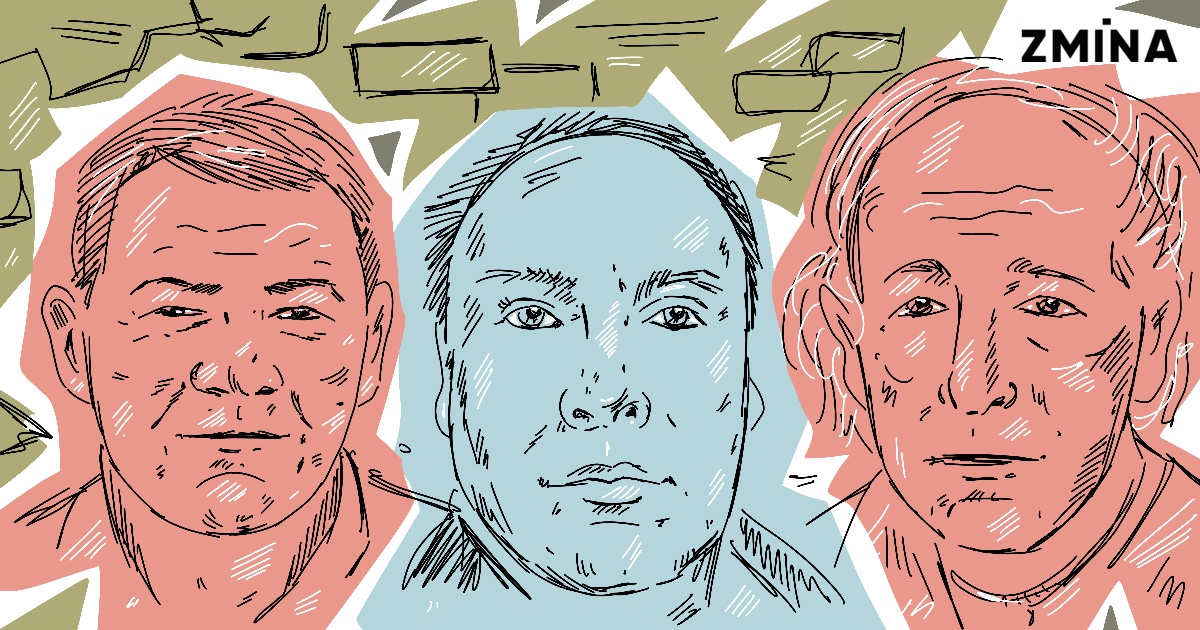
“If you are indignant, you will disappear without a trace, and no one will find you.”
In January 2023, relatives of Yamkovyi agreed with a carrier to take a man from Kahovka to Russia for approximately 1,000 UAH (roughly $28). When Yevhen Yamkovyi appeared on an agreed date for his travel, the carrier announced an increase in the price for his services to 1,500 UAH (~$41). Yamkovyi did not have this money, so both men made a deal that the driver would get Yevhen only to the border of occupied Crimea.
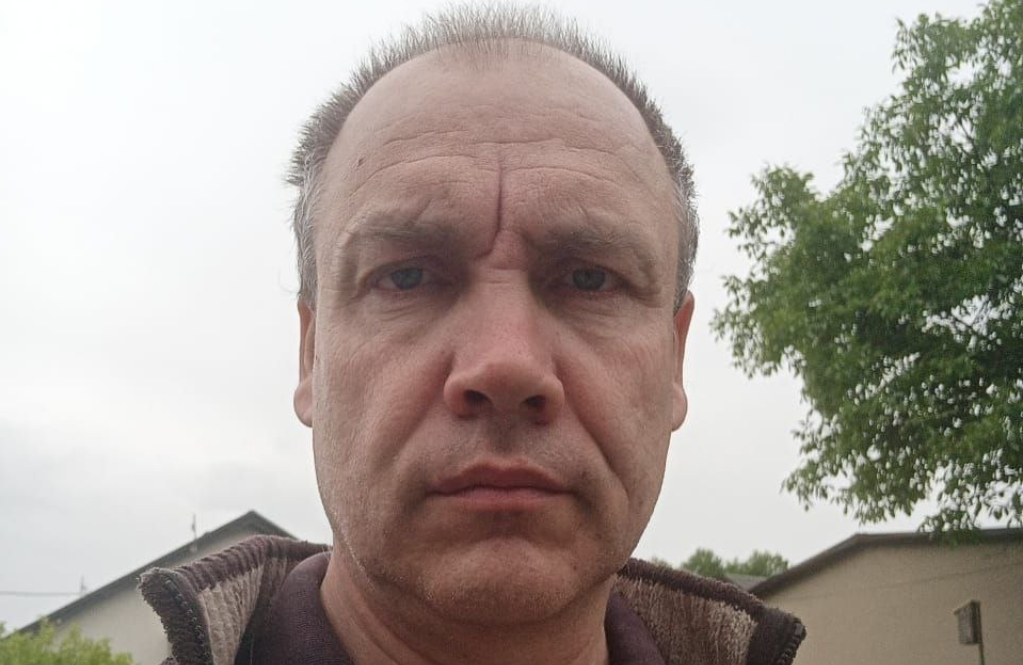 Yevhen Yamkovyi. The photo was provided to ZMINA by Yamkovyi’s family.
Yevhen Yamkovyi. The photo was provided to ZMINA by Yamkovyi’s family.At the checkpoint “Armyansk,” Russian occupying forces took ten people for an “interview.” Yamkovyi was one of them. During the interrogation, which was held in three wagons and formed a U-shape, Russians found photos of the results of the shelling in Yevhen’s cell phone.
As soon as they saw pictures, one of the investigators of Russian occupying forces claimed: “So you are a fire adjuster!”
Yamkovyi explained that this cell phone did not belong to him but to his acquaintance and that he knew nothing about these pictures. Russians started interrogating the man about the cell phone and what he had heard from his acquaintance.
“I spoke to them in raised voices and tried to explain that I am not a fire adjuster. That it was a cell phone of my acquaintance who used to serve as a policeman. Also, I asked them how “neighbors” [Russian occupying forces] came to our territory and started to kill our people. They responded that it was not up to us to decide. I was held there for approximately eight hours.”
After the interrogation, Yevhen was handcuffed with cable ties, put in a car, and taken to the local department of Russia’s Federal Security Service (FSS) in Armyansk. A man was kept in a room with a couch, TV, and fridge for a night. The next day, Yamkovyi was put in a car again and taken to Simferopol. In occupied Crimea, Yevhen was locked in some basement where he was held all day.
“I guess that I was taken to the local office of FSS. The basement had a made bed, two chairs, and a table. I was chained to the sewer pipe all day. Then, the investigator took me to the yard, where I was held for around ten minutes. I was with some guy who was probably brought there for interrogation,” Yevhen says.
Later on, Yamkovyi, together with a guy, was put in a сar and taken to the Simferopol pre-trial detention No. 2. Right on the first day, prison guards beat the man so brutally that the swellings on his legs did not go down for a month and a half.
Russians made him spread his legs so vast that he almost sat on the splits.
They shouted: “Bend lower! Spread your legs wider! Did you not understand? Even wider!”
If the prisoner did something wrongly, he was beaten on the legs. Prison guards did it not bare-handed but in tactical gloves. They had tactical shoes on their feet too.
Yamkovyi recalls: “We were forced to keep our heads down, hands behind our backs, and legs as wide as possible. The guards beat me on my shoulders, chest, sides, and legs. I told them: “Guys, you have taken the wrong person.”
And they answered: “Yes, mouth closed, you are nobody here, and your name is nothing. You will disappear without a trace if you are indignant, and no one will find you.”
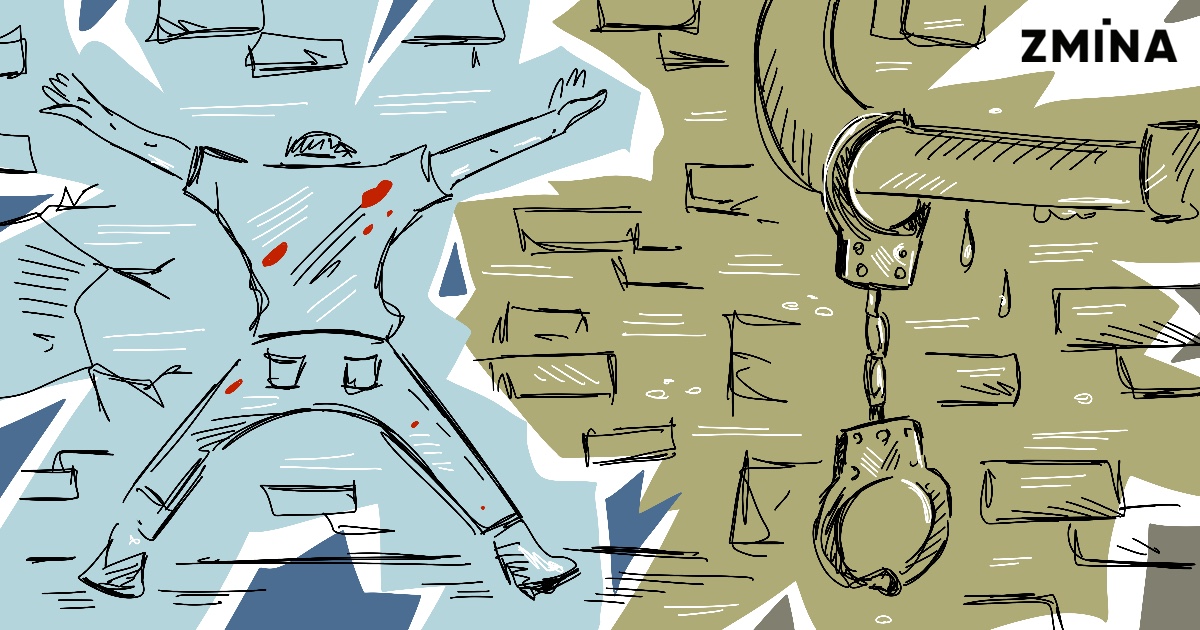
Before Yevhen was taken to the cell, he was thoroughly searched, including his clothes and shoes. His shoelaces were taken away, so he would not be able to hurt himself.
Russian occupying forces held “educational works” for two days with the man. Namely, they took him out of the cell, removed all his clothes, and bent him in half.
“There were no bruises on the body because I was straining it. Therefore, it was more or less normal. As soon as I relaxed, they could break my ribs,” Yevhen explains.
Then, interrogations began, during which investigators asked a man about his acquaintance: where they met, what he told, who he was, etc.
If the Russian was unsatisfied with the answer, he repeated: “Start to speak, or I will call the other guys, and they will quickly open your mouth.” Yevhen responded: “Chief, I told you what I knew. You can call anyone you want.”
Following these words, the man returned to the prisoner’s cell.
Yevhen was taken to the FSS office for interrogations. Every time before his exit from the pre-trial detention center, he was forced to remove his clothes for additional checks with the metal detector. The same procedure was held after he returned from his “interviews:”
“Come on! Why are you so slow? Go hurry!” They told this to me every time. And you had to do everything at such a rush pace. You are innocent, but still, you are guilty of ending up being there.”
When Yevhen ended up in the pre-trial detention center in Simferopol No. 2, he was dazed for almost a month and a half.
Every day, a new duty officer was appointed to the cell, who had to report to the guards: how many people were there and whether anyone had any comments or requests. Due to the state of shock, the hostage was constantly stuttering and could not utter even one sentence to the end:
“As soon as I tried to say something, I started shaking. I was afraid I would be beaten if I said something wrong. I spent whole days standing by the door, where a piece of paper with the schedule and rules was pasted, and I read it. When I relaxed a bit later, I started to talk normally.”
Yamkovyi noticed that the special forces came to the pre-trial detention center No.2 to control everything. However, they did not have warm relations with the administration of the penitentiary institution.
“Say “Thank you” to a Russian soldier that he did not shoot you.”
Yevhen was held in the cell together with Oleksandr Babych, the mayor of the city of Hola Prystan’ in the Kherson region, and Mariano (Mario) Calatayud, the volunteer from Spain.
When he was brought to them, he immediately began to hug them. Oleksandr asked where he was from and introduced himself, and Mario began to say something in Spanish.
They told Yevhen that they had been imprisoned on the territory of Crimea for almost eight months already. At first, they were held in the pre-trial detention center No. 1. Then, in October 2022, they were brought to the pre-trial detention center No.2.
Babych told Yevhen that the FSS forces people to stand straight all day, including civilian hostages. He shared that [Russian occupying forces] use the electric shocker and can loose dogs. Mario even showed Yevhen marks of electrocution and a dog bite.
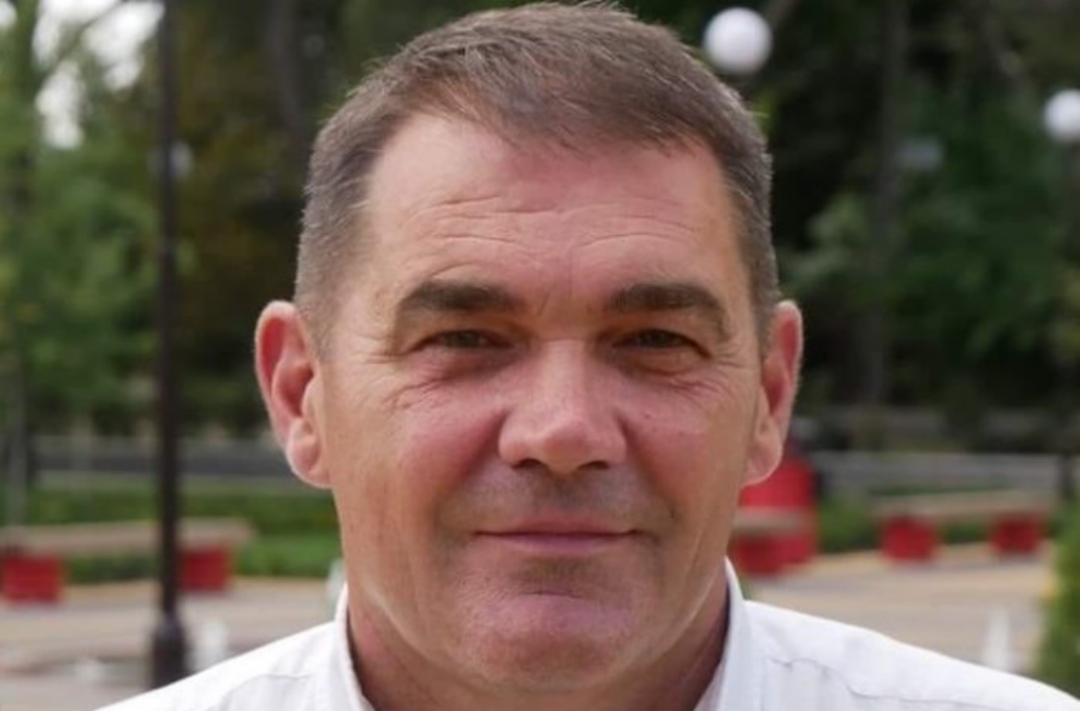 Oleksandr Babych
Oleksandr BabychBoth men, Babych and Calatayud, were tortured in the pre-trial detention center No.1. It was more or less okay to be in center No.2. They even started to feed [prisoners] normally.
“Oleksandr lost a lot of weight. After I was released, I found pictures of Oleksandr on the internet and compared them to how he looks now. He lost a lot of weight. He was interested in everything, especially if there was any new information. Oleksandr tried to analyze everything, put it “on the shelves,” and understand what was happening,” notes Yevgen.
Oleksandr told Yevgen about his detention. That day, the official took a shower, got dressed, and was going to go to work. As soon as he left the house, he saw a column of military equipment (up to 15 units) moving in his direction. The cars stopped near the fence, and armed Russians got out of them and asked if he was Babych. After hearing an affirmative answer, the occupiers ordered the mayor to go with them.
“Oleksandr did not even have time to take documents with him. He just closed the door and asked them [Russians] to take him to his work so that he would give some tasks to his employees. Afterward, they put a bag on the man’s head, put him in a car, and took him to the city council,” Yevhen recalls.
According to him, after the city council meeting, Oleksandr was brought outside the city to a ravine and taken out of the car. A bag was removed from his head, and they [Russian occupying forces] started shooting in his direction.
After firing several rounds, the Russians said: “Say “Thank you” to the Russian soldier that you were not shot.”
The occupiers reproached the man for being the mayor and carrying out all orders from above.
They constantly said: “You held rallies against the Russian authorities. Why didn’t you run away like your family? Why did you stay here? You had to run away.” Oleksandr answered them: “I have such a position that I have to work with people. And as the city’s mayor, I cannot leave people behind.”
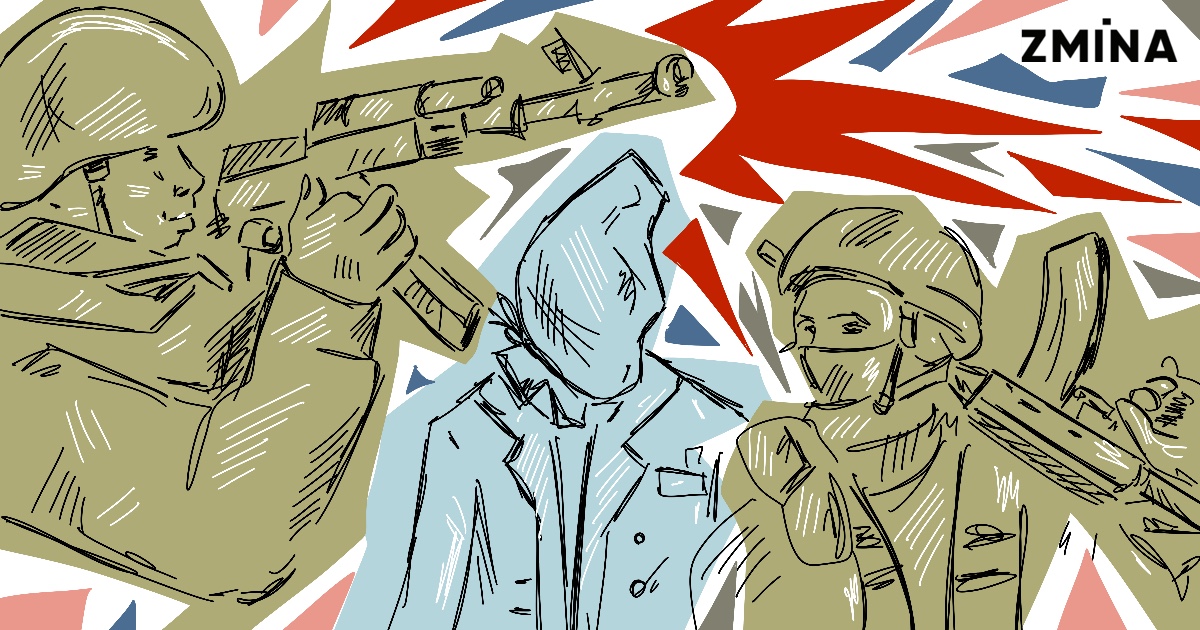
Yevhen also mentioned that Oleksandr Babych and his subordinates organized the municipal defense, which patrolled the city day and night to protect residents’ property from looters.
The man also told that Babych was taken to then-occupied Kherson, where he met Mariano Calatayud. Since then, both men are kept imprisoned together. Oleksandr, who used to learn Spanish in the past, became a translator for Calatayud.
Yevgen Yamkovyi recalls how during the imprisonment, they ran along the corridor for a walk, and Oleksandr, who has a sore back, straightened up. The special agent hit him with such force that a considerable bruise appeared on his arm. The prisoners thought that Oleksandr’s rib might have cracked because of it.
“Oleksandr is a great person. When I could not report in front of the prison guard, he supported me and told them that I was not in the best shape and was a bit nervous.” Then, when we returned to the cell, I hugged him and told him I was grateful for his support. He responded that everyone went through similar situations,” Yevhen shares.
Oleksandr also said that three women were held with him in the pre-trial detention center in Kherson. One of them was Iryna Horobtsova. They were even transported all together in one car to the occupied Crimea. In the Simferopol pre-trial detention center, Iryna was placed in solitary confinement.
According to Yamkovyi, Oleksandr believes the Russians are holding him captive because of the former people’s deputy and collaborator, Oleksiy Kovalev. [Kovalev was a Servant of the People party member and was assassinated on August 2022 in the Kherson region.]
They connected the current to the body and injected unknown drugs.
Mariano (Mario) Calatayud told Yevgen that he was detained near the food store where he went to make purchases. As he was leaving the supermarket, he was met by six men who were clearly waiting for him.
They asked if he was a volunteer.
After hearing an affirmative answer, the occupiers told him to come closer to them and began to twist his arms and beat him. There were six of them, and they could not cope with the 75-year-old man. As he resisted desperately, it took them long to subdue him.
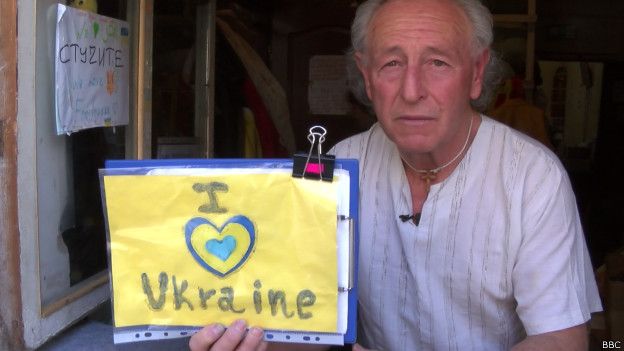 Photo of Mariano (Mario) Calatayud
Photo of Mariano (Mario) Calatayud“Mario had six teeth knocked out. He pulled them out because the dentist they [Russian occupying forces] called did not come. Mario has scars on his body, and his weight has decreased by 15 kilograms,” Yevhen shares what he saw.
Mario told him that after the abduction, he was tortured: an electric current was connected to his genitals and legs, and he was mercilessly beaten and injected with unknown drugs (the man suggests that it could be morphine).
The volunteer does not even remember what he said to his executioners.
The Russians did this to find out the PIN code of his bank card. But even if he informed him, they would still be unable to access the card. The Spanish bank automatically blocks the card if unused for two days.
When Mario was still in Spain, his familiar banker constantly told him: “There is a war in the country. Where are you going?”
To which Mario replied: “You have to help people.”
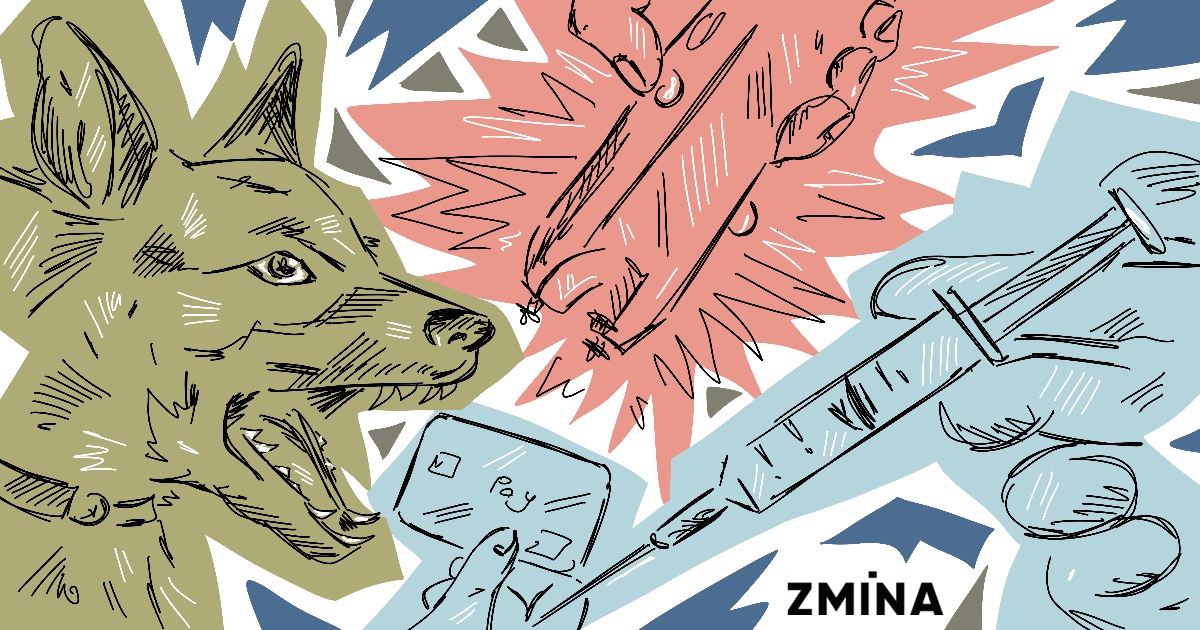
The Spanish volunteer told Yevgen about how they were lined up and called every day in Simferopol’s pre-trial detention center No. 1. During one of them, Mario was bitten by a service dog, leaving him with a deep scar on his leg.
When the animal latched onto the knee of a 75-year-old volunteer, a young prison guard who saw it mockingly asked: “Are you in pain?”
Mario’s leg was bleeding, and the guards stood there laughing. Unable to bear the pain, the volunteer hit the dog.
Then, one of the guards pulled out a stun gun and shocked the man.
Yevgen also recalls that Mario’s legs swelled due to high pressure. In addition, he was dressed in winter jeans.
Inexplicable rashes began to appear on the hands.
The Spaniard even asked the head of the pre-trial detention center to order tracksuits for him and the other people sitting with him. Instead, he was given a cream, which he used constantly.
Later, according to Yamkovyi, Yevhen Melnychuk, the Crimean activist, was transferred to their cell.
In the occupied Crimea, he was detained for photographing military equipment.
During the interrogations, a bag was put on the man’s head, and he was strangled until he agreed to sign some documents. In the FSS office, Melnychuk, like other civilian hostages, was tested on a polygraph.
Dreamed freedom
On April 7, 2023, the guards and the investigator ordered Yevhen to pack his things and leave the cell. He had a few items: a toothbrush, soap, and toothpaste. He had only a T-shirt and pants in which he was detained. Later he was given a jacket, and then he found someone’s sweater in the cell.
Having found himself free, Yevgen immediately left the occupied Crimea for Poland, where his daughter lives.

